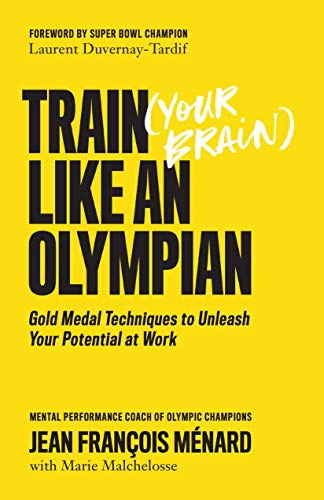
Train (Your Brain) Like an Olympian - by Jean François Ménard
Date read: 2023-05-01How strongly I recommend it: 4/10
(See my list of 150+ books, for more.)
Go to the Amazon page for details and reviews.
Written by an Olympic Performance Coach, this book focuses on how you can apply the practices that Olympians use to train in the workplace. Most of this is very "self-help" and relies on basic knowledge of positive thinking, being in the moment, and breaking down situations focusing on small wins. Lots of examples but overly positive and not that beneficial.
Contents:
My Notes
Every day they would ask themselves, “How can we be better?”
These types of performers know that if you want to fill your toolbox, you have to want to open it first. Well, to learn just about anything, first you need to open your mind. You must choose to become your own best coach.
“I make it a point to learn a little something new each day. I like to go to bed at night knowing that I’m better than I was when I woke up in the morning.”
Success isn’t based on luck. Success comes down to a limitless desire to learn. Great athletes understand that being successful isn’t about measuring up to others. It’s all about measuring up to yourself.
The best learning experiences happen when we have clear intentions. Purposeful, intentional, and meaningful goals will help us really progress.
There’s no point in criticizing yourself too much. By remaining objective, you’ll focus instead on the details that explain your poor performance and come up with solutions to bounce back.
Athletes don’t need someone else telling them to improve; they create their own opportunities to learn.
The important lesson here is to challenge yourself and leave your comfort zone if you want to excel.
What’s better: adding years to your life or adding life to your years?
To reach the top, you have to go about things differently, look to distinguish yourself, and be ready to do more than others in your field.
Dream and dream big: With a little tinkering, impossible can become I’m possible.
The minimum principle - This principle helps build momentum, as they say in the sports world, so that you can maintain a certain pace with assurance and enthusiasm. It’s also a question of perspective. If I go to the gym once during the week with the goal of only going once, then it’s mission accomplished. On the other hand, if I go to the gym twice, with the goal of going five times, the likelihood of my giving up increases tenfold. Never underestimate the power of the minimums.
Interactive self-motivation - “One of the best ways to motivate yourself is to motivate others.”
180 degrees - Take the time to stop, turn 180 degrees, and take stock of the progress made in carrying out a project or a task.
Knowing “why” - Why they do what they do. I encourage you to create your own why. Two tips to keep in mind. First: keep your why fairly short so that it’s easy to remember. Second: use words that are meaningful to you.
Have to vs. want to - Saying “I want to” encourages us to take action, rather than put ourselves in the position of feeling forced to do something.
Sharing your dream - By sharing our dream goals with the people around us, we take ownership of them.
Visualize the dream - I helped a business leader create his own personal dream board, which led him to organizing his goals much better. He focused on three specific streams: family, work, and himself.
When we’re overflowing with self-confidence, we tend to lean in more, leave less room for doubt, and take more risks. Sometimes, this can also lead to feeling indestructible. When we feel like this, our intention is to perform to win, not to avoid losing.
I often tell my clients, “If you feel confident, it’s your fault. If you lack confidence, it’s also your fault.” In other words, self-confidence is something of which we are entirely in control.
Make sure to celebrate the small wins to build up your self-confidence. Take the time to congratulate yourself.
The act of complaining is like rocking back and forth in a comfortable chair. It offers temporary comfort, but it doesn’t get you anywhere!
Being mentally tough means choosing the right attitude even when a situation defies you.
To help golfers get in their zone in preparation for their next shot, I ask them to imagine a five-meter circle around the ball. The golfer starts their pre-shot routine only when they step inside that circle. You can create a similar circle at work. A location or application that when you're in it, you're dialed in and fully committed.
It’s become one of the reasons employers like to hire former high-level athletes: they’ve already mastered the skill of zoning in when it comes time to perform. The same is true for musicians.
Take some time, each day, to pay attention to your senses to capture some of the details that you normally miss. This ability will improve over time and will serve you well at work.
Being attentive means using the senses optimally to grasp a situation and better understand a discussion.
Legendary football coach Lou Holtz created the acronym WIN for “what’s important now” to remind his players to focus on the present moment during each game.
Keep in mind the popular acronym FEAR: false evidence appearing real. It’s a simple way of remembering that most fears aren’t true and are often nothing more than a story that we’ve invented in our own minds.
Remembering that FEAR could also serve as a launching pad, she loved this version: Face Everything And Rise.
Elite performers manage themselves like thermostats: they stay cool when the heat is on.